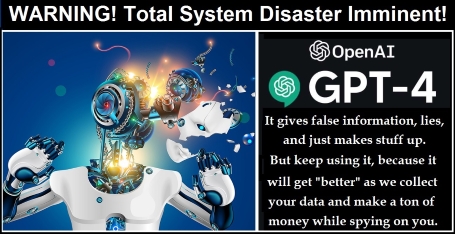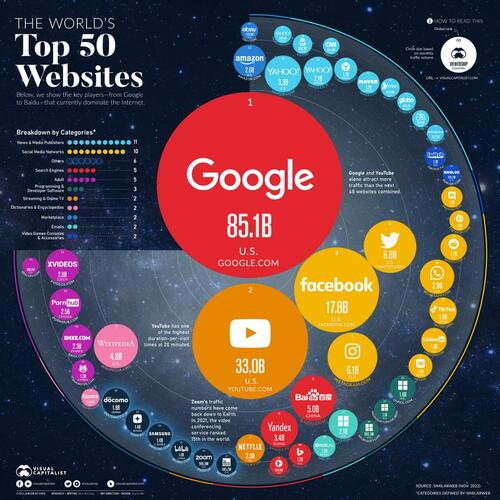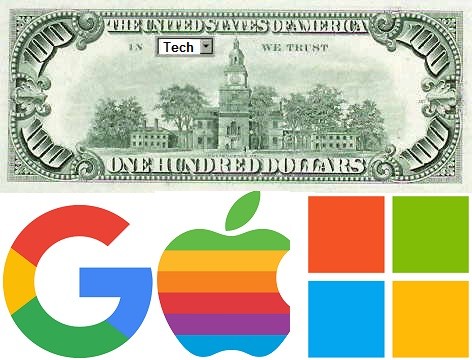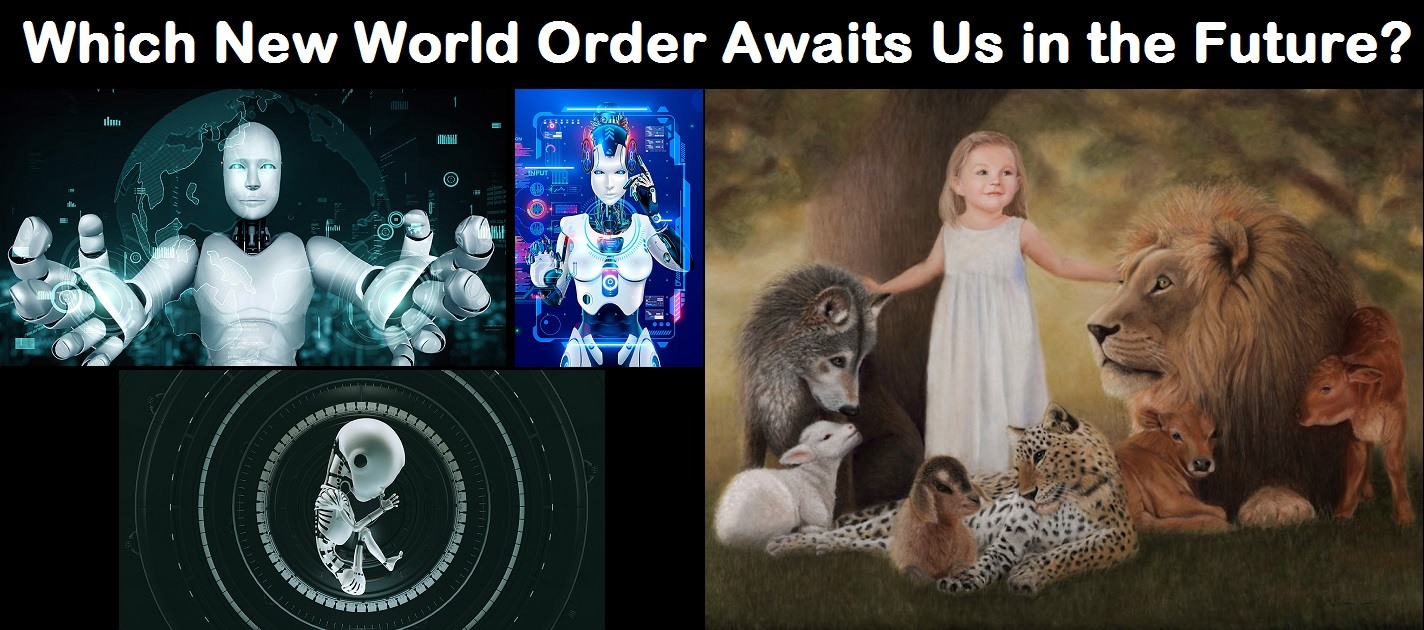WARNING: Faith in Artificial Intelligence is About to Destroy America – A Total System Collapse May be Imminent

by Brian Shilhavy
Editor, Health Impact News
As we now enter the first week of the second quarter here in 2023, the United States stands on the brink of a total financial collapse.
There are many ways to view the current economic crisis we all face, and the economic factors that have brought us to this point today, such as the steps that were taken in 2008 during the last economic crisis which never solved the problem, but only kicked the can down the road until the crisis grew bigger, or the role that COVID policies played starting in 2020, or the myriad of other factors that have led us to the place where we all stand today.
But the view that I choose to write about and explain, since so few others are writing about it, is the Big Tech collapse that began in 2022, with the blowup of the FTX cryptocurrency exchange, and the massive layoffs that began in the world’s largest technology companies.
While it is hard to put a number on the total financial loss in the U.S. economy due to the FTX collapse, over $30 billion alone was lost just due to bankruptcies of some of the largest cryptocurrency exchanges. (Source.)
And that does not include the two largest cryptocurrency exchanges, Binance and Coinbase, which today are in serious trouble and could also be facing failures and potential bankruptcy.
This crisis spread to the banking industry at the end of the first quarter this year, with banks heavily invested in the cryptocurrency market experiencing bank runs and collapse, including Silicon Valley Bank, which at the time was the 15th largest bank in the U.S.
And more banks face failure today, as the bank runs have not stopped. See:
Second Wave of Bank Runs Start – Demise of the U.S. Dollar as the World’s Reserve Currency Accelerates
Of course it wasn’t just investments lost from cryptocurrencies that led to these bank collapses, there are many other factors involved such as the Fed’s aggressive interest rate hikes, and the banks’ failures to have enough money on deposit to cover accounts above the FDIC insurance limits, for example.
In years past, this much loss of liquidity in the economy would have crashed the entire system, including the stock markets.
But the markets haven’t crashed yet, partially because there is so much money in the system that the Fed has created since 2020. And not only has the U.S. stock market not crashed yet, the one sector that one logically would conclude is in the middle of massive correction, the technology sector, which investors should avoid like the plague, is the one sector that is actually increasing, even since the bank failures.
This sector, represented mostly on the NASDAQ, is holding up the entire financial system right now (at least as of the end of the last week in March), and I am not the only one questioning the logic of seeing Big Tech as a “safe haven” to park money into today.
Are tech stocks becoming a haven again? ‘It’s a mistake,’ say market analysts.
It’s a mistake for investors to view tech as a safe haven as fundamentals of the tech sector have deteriorated since last year, say market analysts.
Volatility among banking-sector stocks caused by the quick collapse of Silicon Valley Bank earlier this month has ignited a rush into technology stocks to the extent that are now seen as a safe-haven trade.
The tech-focused Nasdaq-100 index, which tracks the top 100 nonfinancial companies listed on the Nasdaq exchange, has risen 18.5% this quarter, and is on pace to book its best three months since the second quarter of 2020.
The index also exited a bear market on Wednesday — it’s currently up 21.4% from its Dec. 28 closing low, according to Dow Jones Market Data.
Meanwhile, the Nasdaq Composite, at 12,013 at Thursday’s close, has advanced 17.4% from its bear-market low, also hit on Dec. 28. The level needed to enter a new bull market is 12,255.95, according to Dow Jones Market Data.
Among the big tech stocks, shares of Apple Inc. have risen 6.6% over the past three weeks, putting the stock up 24.8% so far in 2023, while Meta Platforms Inc. is up 72.7% over this period and Google’s parent, Alphabet Inc., is up 14.3% on a year-to-date basis, according to Dow Jones Market Data.
“If we look at the very interest-rate sensitive-tech industry from a valuation perspective, what’s been happening is that a lot of those stocks went down much further than the market in general last year. You’re seeing investments going back into those now,” said Jimmy Lee, chief executive officer of the Wealth Consulting Group.
“Investors are feeling safer in the bellwethers of the companies that dominate their industries,” Lee told MarketWatch in a phone interview. “And a lot of the analysts are now looking at these stocks and [asking], Are they really growth stocks, or are they more value stocks?”
The recent boost to Nasdaq valuations from declines in interest rates was certainly a welcome change, but tech stocks do need to support their prices with fundamentals, which have “deteriorated meaningfully” from last year, according to market analysts.
“It’s a mistake for people to view tech as a safe haven in this environment,” Michael Landsberg, chief investment officer at Landsberg Bennett Private Wealth Management, told MarketWatch via phone. He said the fundamentals of tech firms are deteriorating as demand starts to soften alongside the onset of a potential economic slowdown.
“That’s why tech companies are laying people off aggressively. They can get away with [fewer] employees now that demand is [lower], but they have to realize their revenues aren’t growing. They’ve got to cut their expenses.”
Suzuki of Richard Bernstein Advisors said his firm evaluates tech stocks from three prolonged lenses.
First, corporate profit, which shows deep declines across all areas of technology and technology-related sectors.
Second, liquidity. Tech stocks are one of the biggest beneficiaries of the record liquidity environment with lower interest rates in recent years, but, as markets entered a period marked by historic tightening of conditions, the biggest tailwind has turned to a negative for growth stocks.
And third, valuations for the sector are still among the highest of any part in the entire market. “It’s hard to make the argument that you’ve had a major shift in the sentiment side of things when tech is still the most concentrated part within the U.S. market. They still hold the highest valuations there, so there really hasn’t been any sort of capitulation with regards to tech stocks,” Suzuki said.
“Our basic expectation would be that growth will probably slow further from here, and that’s going to be negative for the tech sector, particularly when you combine it with the fact that their valuations are high and liquidities continue to tighten,” said Suzuki. (Full article.)
So if Wall Street financial analysts are warning that Tech stocks are NOT a safe haven to put money into today, what is causing this faith in technology to continue drawing investors, which appears to be the only thing holding up the economy right now and stopping a complete financial collapse?
ChatGPT Artificial Intelligence: A $1.59 Trillion Market by 2030??
We don’t need to look far to see what is causing the latest feeding frenzy in technology these days, as it is in all of our news feeds on a daily basis: Artificial Intelligence Large Language Models (LLMs), such as ChatGPT.
LLM based Artificial Intelligence is believed to be a market that will grow to over $1.59 trillion by 2030.
AI Startups Turn to Retail Investors To Fund the Growth of the $1.59 Trillion Artificial Intelligence Market
With the rise of ChatGPT and similar artificial intelligence (AI) tools on the horizon, the AI market has massive potential.
A report from Precedence Research estimates the global AI market will grow to over $1.59 trillion by 2030. That number represents a 38.1% compound annual growth rate from 2022, which might prove low given AI’s expected role in most facets of everyday life.
Alphabet Inc. (NASDAQ: GOOGL) plans to integrate its generative AI into Google Workspace and its suite of collaboration and business tools, including Gmail and Google Meet.
In February, Alphabet announced a $400 million investment in Anthropic, which recently launched its chatbot Claude to rival ChatGPT.
Where one tech giant operates, the others are also in the mix. Microsoft Corp. has a $10 billion multiyear partnership with OpenAI — the company behind ChatGPT — that includes Microsoft Azure as the exclusive cloud partner for the AI tool.
While it’s clear Silicon Valley and Wallstreet have been pouring money into AI, another unexpected group of individuals are getting in on the action as well. Retail investors have been investing millions into AI startups…. (Source.)
However, as in all other technology financial bubbles in the past, all of this money is being bet (not “invested”) on the future, not the present, because all we have today are prototype models that don’t even work correctly.
In spite of all the hype you are reading on a daily basis regarding the latest “AI technology” with these chat bots, they are not actually producing any revenue yet.
They are simply sucking up much of the remaining capital in the U.S. market.
Cherlynn Low, writing for engadget.com, just published a very informative video a couple of days ago that is under 10 minutes long as she evaluated the actual usefulness of the two largest AI chatbots today created by Microsoft and Google, and where those products stand “right now.”
These new AI chatbots are admitted to be “highly experimental and flawed,” even by Google and Microsoft. They routinely provide inaccurate information as “fact,” and even flat-out lie and just make stuff up.
These new software products are obviously not producing any income for investors yet.
So why are investors pouring $trillions into this new technology??
The main reason investors are rushing to get a piece of this action that has yet to provide any economic model of producing income, is for one main reason: EVERYONE WANTS TO USE THEM!
According to a February 3, 2023 article by ZDNet, “ChatGPT became the fastest-growing ‘app’ of all time,” being downloaded 1 million times in a single week, reaching 100 million active users in January, just two months after its launch in late November, 2022.
And that’s for a program that doesn’t even work correctly yet.
ChatGPT just became the fastest-growing ‘app’ of all time
ChatGPT user numbers are growing faster than TikTok’s viral rise.
The AI ChatGPT has been a surprise sensation, even rattling Google due to its fast-rising popularity — and now analysts at Swiss bank UBS think it is also the fastest-growing consumer app in history.
UBS analysis estimates that ChatGPT had 100 million active users in January, following its launch two months ago in late November. It attracted one million users in just one week.
As Reuters notes, ChatGPT’s growth is a lot faster than the nine months it took TikTok to reach 100 million, and the two and half years it took Instagram to get there.
In a much earlier era of the web, Google and Facebook took about five years each to reach 100 million users. (Full article.)
This is, sadly, the typical history of investments in technology. The belief is that if you can develop something that is popular with the masses and accumulate a huge database of users, in time they will figure out how to make money off of it.
Sometimes it pays off, as it did with Amazon.com which went more than a decade before it turned a profit, and just kept sucking in revenue from venture capital firms to keep the company running long enough until it could start earning a profit.
Jeff Bezos was doing something nobody else had done before with online shopping, and was accumulating a huge database of users that was very attractive to investors, not to mention the military industrial complex and their “intelligence” agencies.
Even to this day, I doubt that retail shoppers at Amazon.com produce enough revenue to support all the technology and infrastructure for their retail sales, and Amazon.com only started turning a profit when they began to build their own server farms and put all their content into the “Cloud,” and then sold that technology to other large resource-consuming Big Tech companies, as well as the CIA, through Amazon Web Services, including Twitter in their early days.
But this kind of “success” that is spawned, not from revenue, but from how many users you can get to use your product, also creates massive financial bubbles as everyone wants to get in on a piece of the action, and venture capitalists bet on which ones will succeed by throwing a lot of money at it.
We saw these kind of Big Tech financial bubbles burst in 2001-2003 with the dot.com crash, and then again last year with the cryptocurrency financial collapse.
And now, the chat AI products are in position to be perhaps the biggest financial bubble of all time, and when it bursts, which could be tomorrow, next week, next month, or perhaps not until the end of 2023 or first quarter of 2024, it most definitely could bring down the entire financial system in the United States.

These chat AI programs are mostly just glorified search engines, and when it comes to searching the Internet and collating the data, Google is King, and has been for a long time.
Topping the list of most-visited websites in the world is, of course, Google. With over 3.5 billion searches per day, Google has cemented its position as the go-to source for information on the internet.
But Google’s dominance doesn’t stop there. The company also owns YouTube, the second-most popular website in the world. Together, Google and YouTube have more traffic than the next 48 websites combined.
The power of YouTube, in particular, is sometimes not fully understood. The video platform is the second largest search engine in the world after Google. (Full article.)
Coming in at a very distant 3rd for Internet searches is Microsoft with their Bing search. ChatGPT is Microsoft’s attempt to get more of the Internet search market share from Google.
The reason they had to release their AI Chat program before it was fully functional, is that they needed to have the public start using it in order to collect enough data to make their chat program more relevant and useful.
They are basically using the public as guinea pigs to develop the AI software, and that is why they are giving away the app for free, and it is also why there was pressure applied to Google to do the same thing in fear of losing market share.
Bill Gates, the founder of Microsoft, is basically taking a playbook page out of Big Pharma’s recent marketing strategy by putting a product out into the market that has not been fully tested yet.
Prior to COVID in 2020, there were only a few pharmaceutical companies who had enough power invested in the FDA to get new products approved, and it was a very lengthy process.
If someone developed a novel, new drug outside one of these “approved” pharmaceutical companies, the best they could hope for was to be able to sell that drug to one of the bigger players and cash in on their research and development.
When COVID was declared a “public health emergency,” one could get a new drug or vaccine into the market much more quickly by getting an emergency use authorization (EUA), basically using the public as guinea pigs to further test and refine the product.
This allowed new companies that previously had never developed a product that was approved by the FDA, such as Moderna, to rake in $BILLIONS.
Now, Bill Gates is apparently trying to do the same thing with ChatGPT and introducing a new tech product into the market to get people to start using and supplying the data they need to further develop and refine the product.
You can understand therefore, why Bill Gates has publicly stated that “Artificial intelligence is as revolutionary as mobile phones and the Internet,” even though he knows that this is pure bull$!*^, and that it is just another way to collect data as he tries to take some market share away from Google on Internet searches.
The REAL Danger of Today’s Chat AI

I need to remind our readers again that in the minds of today’s Technocrats, “data” is the new gold rush, and:
“Those who control the data control the future, not just of humanity, but the future of life itself, because data is the most important asset in the world.” – Yuval Noah Harari
See:
“Dataism” is the New Religion of AI and Transhumanism: Those Who Own and Control the Data Control Life
I have not tried Microsoft’s new ChatGPT, because when I went to try and test it out, it required me to create an account and supply a cell phone number to verify my identity.
I don’t do that, as I do not even own a cell phone with an active account anymore.
If you own and use a cell phone today, almost everything you use that cell phone for is being recorded and stored in a Cloud database somewhere, and your data is for sale to the highest bidder.
Often that is the U.S. Government, but the oil rich countries like Saudi Arabia and the United Arab Emirates are increasingly buying up technology companies and data as well.
Pause Giant AI Experiments: An Open Letter
The Future of Life Institute got a lot of media exposure last week, in both the corporate and alternative media, when they published an alleged “Open Letter” where they called on “all AI labs to immediately pause for at least 6 months the training of AI systems more powerful than GPT-4.” (Source.)
Two of the biggest names among the signatures of this “Open Letter” were Elon Musk and Steve Wozniak. This looks like a deepfake to me, as these two guys have traditionally been competitors with Bill Gates and Microsoft, and they might just be protecting their own interests in AI, and know that Microsoft has a head start on them.
Wozniak certainly is NOT afraid of AI replacing humans, as he stated publicly back in February, where he said that AI was way over-hyped.
“I was convinced by a certain date we’d have computers that had emotions,” says Apple Co-Founder @stevewoz. “But I decided to change my mind. AI is only going to do things that help humans…Humans will always be in control.” pic.twitter.com/Nea0w7K29J
— Squawk Box (@SquawkCNBC) February 9, 2023
“Elon Musk and Steve Jobs are very similar, and I don’t like to say that,” says Apple Co-Founder @stevewoz. “They both want to be seen as the important person and be like a cult leader. But a lot of honesty disappears when you look at @elonmusk and $TSLA.” pic.twitter.com/A5YUt5ZNIs
— Squawk Box (@SquawkCNBC) February 9, 2023
Another group allegedly composed of “AI ethicists,” published a response claiming that this letter failed to address the current dangers of AI.
Well-known AI ethicists are slamming an open letter that calls for a six-month “pause” on the development of artificial intelligence, saying that it only focuses on hypothetical future threats rather than current, real-world harms.
The open letter—signed by Steve Wozniak and Elon Musk, among others—cited the disruptive consequences AI could unleash on society, and called for AI labs to immediately pause the training of systems more powerful than GPT-4, Open AI’s latest artificial intelligence system.
In their rebuttal, ethicists argue that “hypothetical risks are the focus of a dangerous ideology called longtermism that ignores the actual harms resulting from the deployment of AI systems today.” It’s signed by Timnit Gebru, Emily M.Bender, Angelina McMIllan-Major, and Margaret Mitchell from the DAIR Insitute, a new research company dedicated to studying and preventing AI-associated dangers.
Those “actual harms” include worker exploitation, data theft, and fake media that supports current power structures and their further concentration in fewer hands, the group says.
The rebuke also points to how police use facial-recognition companies and databases like Clearview AI to charge innocent people.
“The current race towards ever larger ‘AI experiments’ is not a preordained path where our only choice is how fast to run, but rather a set of decisions driven by the profit motive,” the letter adds. “The actions and choices of corporations must be shaped by regulation which protects the rights and interests of people.” (Full article.)

I am not familiar with the DAIR Institute and these “AI ethicists,” but their alleged concerns over AI and possible government regulation should strike fear into every venture capitalist that is now pouring $billions into this technology, because the entire industry could go down in a crash by a simple act of Congress, and it appears that Italy is now doing just that, by banning OpenAI’s ChatGPT over privacy violations this past week.
Italy Bans OpenAI’s ChatGPT Over Privacy Concerns
Italy’s data protection authority has temporarily banned OpenAI’s ChatGPT over alleged privacy violations. The ban will remain in effect until OpenAI complies with the European Union’s privacy laws.
In a statement, the Italian National Authority for Personal Data Protection said ChatGPT violated the EU’s General Data Protection Regulation (GDPR) in multiple ways, including unlawfully processing people’s data and failing to prevent minors from accessing the AI chatbot.
The Italian privacy regulator warned OpenAI it has 20 days to respond to the order or face fines. (Full article.)
The other elephant in the room regarding the rush to get these AI chat bots out into the hands of the public before they are even working correctly, is how are the legal ramifications of using other entities’ copyrighted material going to be handled by the courts if these Big Tech companies get sued for copyright violation for the AI bots scraping copyrighted information from the Internet?
I was in a Technology discussion forum this past week (behind a paywall so I cannot link to it) where this very issue was being discussed.
One person who posted a thread on this topic described their experience on this topic:
“I have spent much of the last 3 decades on issues on copyright in a digital age. I ended up chairing a study committee on copyright for the National Academy of Sciences.”
This person went on to write (in part):
An LLM is really a sophisticated index to a collection of knowledge. It is well established that an index can be copyrighted independent of the collection. So an LLM is clearly protected by copyright.
However, even more established law is that any derivative work of copyrighted content requires compensation to the owner of that content. To the extent that an LLM was trained on copyrighted content compensation is owed to the owners of that content. How you can calculate that is unknown, but that is the law. There are precedents in music where even a few notes in one song contained in another are considered infringement.
Congress eventually created a statutory license to enable music streaming where the Librarian of Congress sets the rate and the streamers are required required to compute and pay that statutory rate. This is possible because each song is distinct. In an LLM, the copyrighted content is unlikely to be distinct. In any case, Congress would need to pass a law to enable this, and maybe it should.
There is only one clear conclusion here. An LLM cannot use copyrighted content without permission and will have to negotiate compensation. So far that seems largely absent from the conversation.
Conclusion: Are we About to Experience the Results of Trusting in Big Tech?

So legislation or legal precedence over privacy and copyright issues could easily cause AI chat bots to come crashing down to reality in the public realm.
Something very similar is also happening right now with the popular TikTok app, which the U.S. Government is now discussing plans about banning. If this happens, $billions in revenue, much of it from “Creator Content”, will be lost to the U.S. economy.
And remember, all of this new AI technology requires more data space to store all the software, and that requires more servers to build bigger Clouds, and more energy to run all the hardware.
Another concern there is that the FTC is now targeting Cloud computing.
The FTC Is Eyeing A New Target: Cloud Computing
Almost lost this week in the crosscurrents from the TikTok hearing, various AI software launches, and banking turmoil was news the Federal Trade Commission has a new tech target in its sights: cloud computing.
While this process is just getting under way, the FTC’s emerging interest in the topic provides a new source of risk for cloud computing companies, which happen to include some of the largest tech names— Microsoft, Amazon, Alphabet, and Oracle. (Full article.)
I have now provided the evidence to back up the premise in the title of this article: Faith in Artificial Intelligence is About to Destroy America.
What do you think? Do you trust Big Tech to carry this economy forward, or will their reckless spending on products that currently have no economic model to produce revenue crash the economy?
To read about my own experience in technology, see:

















